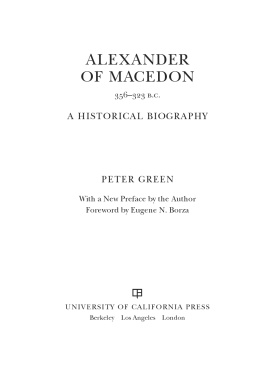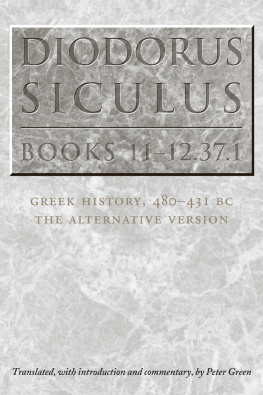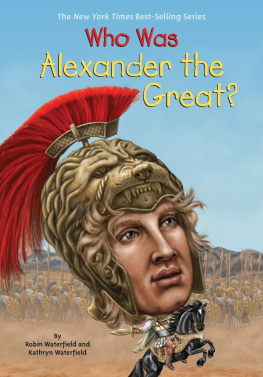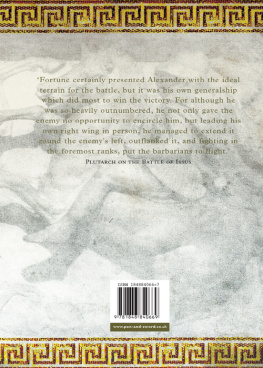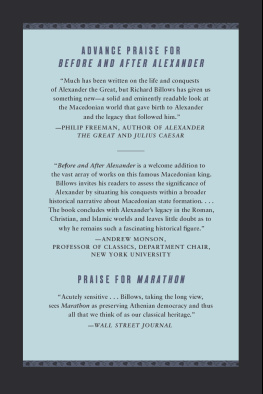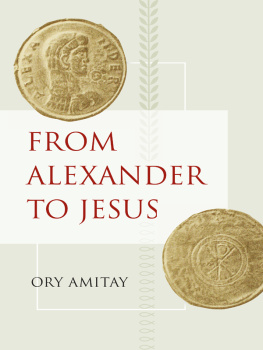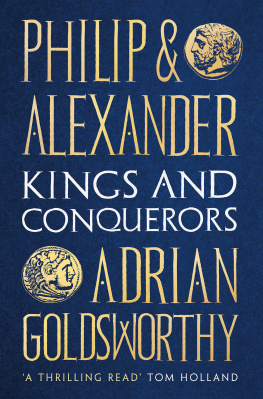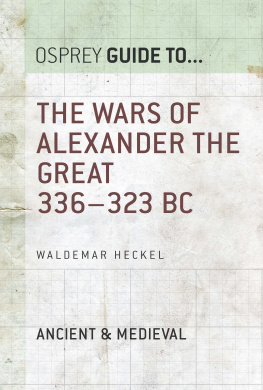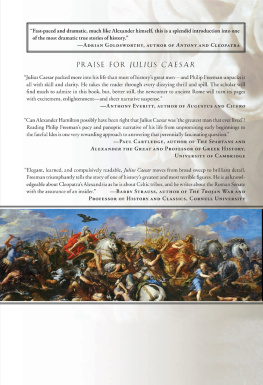University of California Press, one of the most distinguisheduniversity presses in the United States, enriches lives around theworld by advancing scholarship in the humanities, social sciences,and natural sciences. Its activities are supported by the UC PressFoundation and by philanthropic contributions from individualsand institutions. For more information, visit www.ucpress.edu.
University of California Press
Berkeley and Los Angeles, California
University of California Press, Ltd.
London, England
1991, 2013 by Peter Green
First UC Press Paperback Printing 1992
ISBN: 978-0-520-27586-7
e-ISBN: 978-0-520-95469-4
The Library of Congress has catalogued the previous edition as follows:
Green, Peter, 1924
Alexander of Macedon, 356323 B.C. : a historical biography / Peter Green.
p. cm. (Hellenistic culture and society : 11)
Reprint. Originally published: Harmondsworth : Penguin, 1974.
Includes bibliographical references and index.
ISBN-13: 978-0-520-07166-7 (alk. paper)
1. Alexander, the Great, 356323 B.C. 3. GeneralsGreeceBiography.4. GreeceKings and rulersBiography I. Title. II. Series,
DF234.G68 1991
938'.07'092dc20
[B] | 91-7292
CIP |
In Memoriam Ernst Badian
Still il miglior fabbro
;
Where is Great Alexander?
Great Alexander lives and reigns
Medieval Greek proverb
, , . , .
I should be glad, Onesicritus, to come back to life for a littlewhile after my death to discover how men read these presentevents then. If now they praise and welcome them do not besurprised; they think, every one of them, that this is a fine bait tocatch my goodwill.
Alexander the Great, quoted by Lucian in
c. 40 of his essay How to Write History
Contents
Foreword
In a revealing autobiographical interview published in the newsletter of the Classical Association of Iowa, Peter Green once described himself as basically I'm a writer. He went on to quote Hamlet's response to the question What do you study, my lord? Hamlet replied, Words, words, words. Words indeed! And for Green not only English words, but words in Latin, ancient and modern Greek, German, Italian, and French. He trained as a classicist at the renowned Charterhouse public school, but several years of military service with British armed forces in the Far East during World War II interrupted his formal education. At war's end he commenced his work as a graduate student in classics at Trinity College, Cambridge, where he was awarded a Ph.D. in 1954.
Disillusioned by what he saw as the stuffiness of the classics profession in those days, Green decided to return to his first love, the literary world (reputedly he had read all of Tennyson's Idylls of the King by the age of six), and he became a literary critic, movie reviewer, TV commentator, and translator of ancient and modern literature. An early love of Greece motivated him to abandon England with his family and take up residence on the island of Lesbos, where he concentrated on a career as a translator from French and Italian as well as Greek and Latin. He eventually joined the faculty at College Year in Athens, where he taught Greek and Latin literature and ancient history, thereby reawakening a love of teaching that he had abandoned earlier. In 1971 he moved to the United States, where he accepted a tenured position at the University of Texas at Austin, an institution he served well until his retirement. While at Texas he guided the education of dozens of graduate students and was a successful undergraduate lecturer. He retired from the university as a distinguished emeritus professor in 1997, at which time he moved to the University of Iowa to join his wife, Carin, who was a member of the classics department there. Since then he has been an adjunct professor of classics at Iowa and has served as the editor of Iowa's classics journal, Syllecta Classica.
There are two Peter Greens. One is the scholar of classics who has written extensively about Greek history, produced literary criticism on Greek and Roman letters, and won high praise for his translations into English of several Greek and Latin authors, including Juvenal, Ovid, Apollonius of Rhodes, and Catullus. He is one of the most prolific English-language classical scholars of our time. The other Peter Green is the critic and journalist. Readers on both sides of the Atlantic will be familiar with his criticism of the arts, especially literature. He is a regular reviewer for the New York Review of Books, the New Republic and the Times Literary Supplement. His enormous capacity for reading and writing was characterized, for example, by an astounding critical review of twenty-five(!) books on ancient Egypt, published in the New York Review of Books at the time of the 1979 opening of the King Tutankhamun exhibition at Washington's National Gallery of Art. In 1981 Green produced a more modestly sized Macedonian counterpart in a biting review of the National Gallery's The Search for Alexander exhibition. In both reviews he not only offered challenging descriptions of the objects but also provided a penetrating analysis of the political forces that lay behind the release of these ancient treasures for display in a foreign country.
No other classicist in recent times save, perhaps, Garry Wills and the late Bernard Knox has combined such eclectic literary and scholarly skills. But Green's talents are more extensive: in addition to his career as a classics scholar and a critic of the arts, he is a novelist and poet (Words, words, words). His major biography of Alexander reveals how his two primary interests inform each other: Green's intense devotion to the literary arts that describe the human condition enriches the portrait of Alexander that emerges from a close reading of the ancient evidence. This is no mere history of Alexander but a full-blown biography (as the title indicates) that seeks to illuminate the character and motivations of one of the most famous people who has ever lived. Green understands perfectly the opening phrases of Plutarch's Life of Alexander:
I am writing biographies, not histories, and it is true that the brilliant exploits often tell us nothing about the virtues or vices of those who performed them, while a chance remark or a joke may reveal more of a man's character than the mere feat of winning battles where thousands die, marshalling great armies, or besieging cities. When a painter of portraits sets out to create a likeness, he relies mainly upon the face and expression of the eyes, and pays less attention to other parts of the body. Likewise it is my task to dwell upon those actions which reveal the working of the soul, and thereby create an individual portrait of each man.
Recent years have seen a proliferation of histories of Alexander's career, most of them designed to satisfy the course-driven needs of the college undergraduate market. These works mainly constitute a recounting of the king's political and military exploits History, not Biography, in Plutarch's terms. Some critics have objected that Green often goes beyond what the ancient evidence permits, a charge that he answers at length in his preface to this edition. Nearly forty years after its initial publication, Peter Green's Alexander of Macedon remains the most eruditeand most literate comprehensive modern assessment of the renowned king.
Eugene N. Borza
Professor Emeritus of Ancient History
The Pennsylvania State University |
Preface to the 2012 Edition
The death of my dedicatee last year and the subsequent finalpublication of his Collected Papers on Alexander the Great offer anatural occasion for a review of the way this book has survivedthe relentless flood of Alexander scholarship since 1991. When,in deliberate and conscious imitation of T.S. Eliot, I appendedthe words

